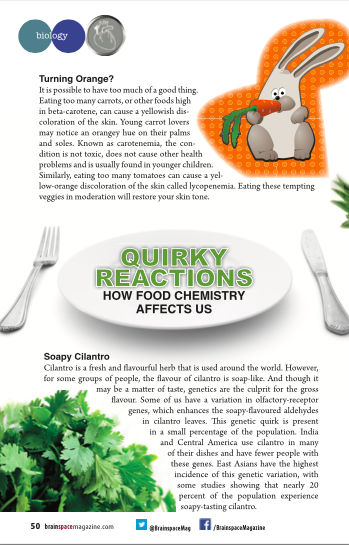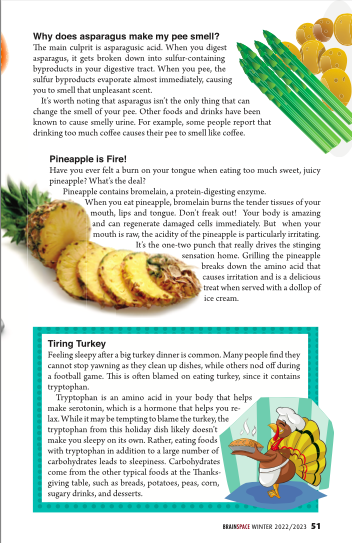
Quirky Reactions


Turning Orange?
It is possible to have too much of a good thing. Eating too many carrots, or other foods high in beta-carotene, can cause a yellowish discolouration of the skin. Young carrot lovers may notice an orangey hue on their palms and soles. Known as carotenemia, the condition is not toxic, does not cause other health problems and is usually found in younger children. Similarly, eating too many tomatoes can cause a yellow-orange discolouration of the skin called lycopenemia. Eating these tempting veggies in moderation will restore your skin tone.
Soapy Cilantro
Cilantro is a fresh and flavourful herb that is used around the world. However, for some groups of people, the flavour of cilantro is soap-like. And though it may be a matter of taste, genetics are the culprit for the gross flavour. Some of us have a variation in olfactory-receptor genes, which enhances the soapy-flavoured aldehydes in cilantro leaves. This genetic quirk is present is a small percentage of the population. India and Central America use cilantro in many of their dishes and have fewer people with these genes. East Asians have the highest incidence of this genetic variation, with some studies showing that nearly 20 percent of the population experience soapy-tasting cilantro.
Why does asparagus make my pee smell?
The main culprit is asparagusic acid. When you digest asparagus, it gets broken down into sulfur-containing byproducts in your digestive tract. When you pee, the sulfur byproducts evaporate almost immediately, causing you to smell that unpleasant scent. It’s worth noting that asparagus isn’t the only thing that can change the smell of your pee. Other foods and drinks have been known to cause smelly urine. For example, some people report that drinking too much coffee causes their pee to smell like coffee.
Pineapple is Fire!
Have you ever felt a burn on your tongue when eating too much sweet, juicy pineapple? What’s the deal? Pineapple contains bromelain, a protein digesting enzyme. When you eat pineapple, bromelain burns the tender tissues of your mouth, lips, and tongue. Don’t freak out! Your body is amazing and can regenerate damaged cells immediately. But when your mouth is raw, the acidity of the pineapple is particularly irritating. It’s the one-two punch tht really drives the stinging sensation home. Grilling the pineapple breaks down the amino acid that causes irritation and is a delicious treat when served with a dollop of ice cream.
Tiring Turkey
Feeling sleepy after a big turkey dinner is common. Many people find they cannot stop yawning as they clean up dishes, while others nod off during a football game. This is often blamed on eating turkey, since it contains tryptophan. Tryptophan is an amino acid in your body that helps make serotonin, which is a hormone that helps you relax. While it may be tempting to blame the turkey, the tryptophan from the holiday dish likely doesn’t make you sleepy on it’s own. Rather, eating foods with tryptophan in addition to a large number of carbohydrates leads to sleepiness. Carbohydrates come from other typical foods at the Thanksgiving table, such as breads, potatoes, peas, corn, sugary drinks, and desserts.

